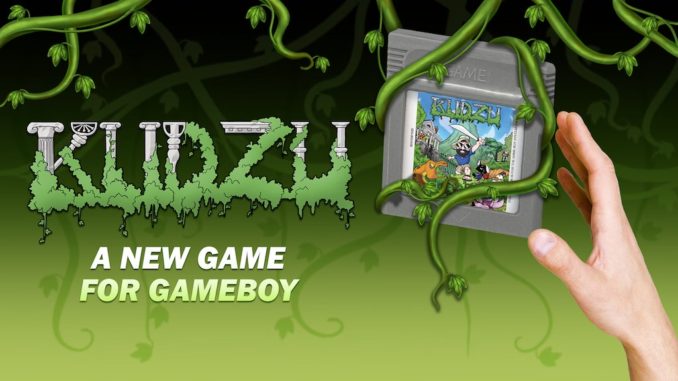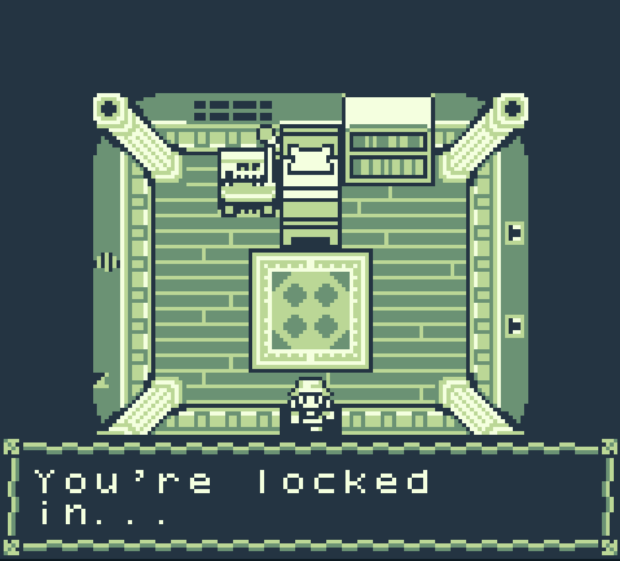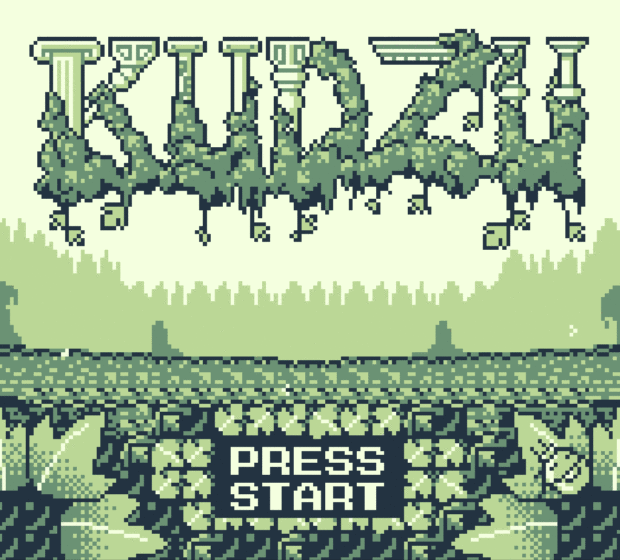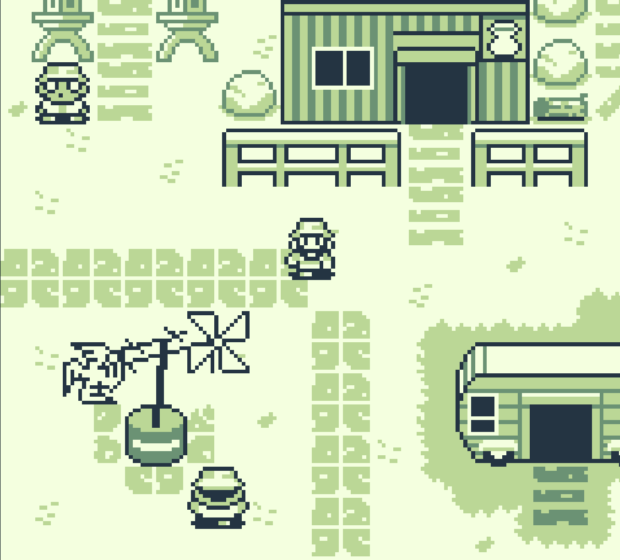

Review Fix chats with Chris Totten, Founder, Pie for Breakfast Studios about his upcoming game, Kudzu, which appears to be a treat for anyone looking for something new and special on the original Game Boy.
About Kudzu:
Kudzu is a non-linear adventure game about a man trying to save his mentor from a world-eating plant. Play as Max, the apprentice gardener, who discovers that his mentor, Zoen, has mysteriously wandered into the nearby kudzu (a group of coiling and climbing perennial vines) field. Dangerous creatures await including snakes, bugs, angry flowers, and numerous other hazards!
Stay Tuned for Their Kickstarter, Coming Soon!
Review Fix: How was this game born?
Chris Totten: The game originally came to be during a conversation between my wife and I around 10 years ago. We saw some kudzu off the highway when we lived in Maryland and I told her about a time in architecture school where my entire group misidentified a field of kudzu and designed all of our projects to include it in our buildings. I was the first to present and got the brunt of the bad review while my group looked on waiting to also be roasted (luckily, my teacher stepped in and asked the reviewer that since he didn’t even know what it was, to please treat it as though it wasn’t actually an invasive species.) My wife told me a story about how her brother used to fight off out-of-control vines in their backyard when they were teenagers with a machete, so we thought it would be fun to make a game about that. I made a design document and some prototypes at the time but nothing really came from it until I found the GB Studio engine that lets people make actual Game Boy games. I thought Kudzu might be a perfect project for it and got to work!
Review Fix: What is your role in the game?
Totten: The development was mostly me with some help on late-game environment art and concept art from students of mine. Brandon Ellis (Cityfires) composed the music and the awesome folks at Mega Cat Studios have been handling publishing and marketing.
Review Fix: What has development been like?
Totten: This was an interesting project for me because I really did originally approach it as a homebrew hobby effort and a way to just fool around with a cool new game engine. Even in this mode though, I like to carefully plan and document every facet of dungeons and maps and did so on this project with lots of graph paper diagrams. At the same time, working quickly and on single-screen rooms rather than big sprawling areas like I would on a more modern-style game was refreshing and felt a lot like doing improvisational jazz. I could focus on one little bit at a time and kind of riff on one or two mechanics to really make them sing.
Review Fix: What makes this game special?
Totten: I guess if I had to come up with something, it would be that I’ve tried to make a game with its own unique setting, vaguely southern with hints of fantasy. The heroes are also gardeners and academics, but ones who are kind of klutzy and forgetful. It riffs on what you know, but tries to be its own thing. It isn’t a homebrew retro game interested in recreating your childhood in a rote way: it wants to be a new Game Boy property that pays homage to the games that came before, but which also builds on them.
The game also came from my wife and I telling one another stories and bits of our personal life (our cats are even in the game), so that’s special to us, but might also be special to those that might care about the stories of games. I’ve tried to pour some wit, heart, and even educational content into the world – you can’t make a game about invasive plants without telling the player about invasive plants can you? Also things like the health potion expansion sidequest (it’s based on a forgotten southern food staple) come from real influences, so a lot of work went into making this feel as much like a world as possible, even on Game Boy and even with a very small team.
Review Fix: What games influenced this one the most?
Totten: The one that most people recognize is Zelda: Link’s Awakening. That’s certainly true, but the game pretty quickly becomes a Metroid-like, lacking a full overworld/underworld structure and playing more with a straightforward labyrinth. In this way the game is very based on Hollow Knight and Metroid Prime‘s structural elements (though obviously not in Hollow Knight‘s grimdark gothic setting.) There are also flashes of Earthbound and Mother 3 in how I wrote some of the characters in the game. I even threw a wind-drinking ghost in there somewhere. I also throw some nods to other Game Boy games in there for fans of the console, things like the design of a gate resembling the castle gate in Super Mario Land 2 and the snake on the cover resembling the one on the box for Kid Icarus of Myths and Monsters. There is a little bit of my inner 9-year-old coming out in it.

Review Fix: Any fun stories or wild moments during development?
Totten: Earlier in development, when my son was 2, I had just bought myself a flash cartridge to use for testing on hardware, so he would carry around the Game Boy, regardless of what game was in it, and say “I’m playing Kudzu!” My oldest also is very much not into combat in games, but does love meeting characters in towns. For this reason, I tried to make it so characters would move around after specific events in the game happen and have different dialog (within the limitations of what I could put on the cartridge, obviously.) Having my kids respond to the game really challenged me to go beyond my own plans for it.
Review Fix: What were the major lessons learned?
Totten: I REALLY enjoyed working in the small scale of Game Boy in general, but also specifically on single-screen level design scenes and encounters. I was really into trying to pack a lot of information into a screen’s length in my level design before, but this gave me a really fun little lab with which to stretch that idea. It’s been a really helpful design constraint in the other game I’m working on, Little Nemo and the Nightmare Fiends. I’ve also started using GB Studio in my game design classes to have students learn encounter design.
Review Fix: Do you think preserving older gameplay mechanics in new games is important?
Totten: I think so, to an extent. I really love the ways we’ve moved onward from distinct game overs and lives in many games, in favor of the more souls-like approach of losing some loot when you fail (Mario even does it now!) This encourages failing and retrying to learn and master the game rather than being discouraged by having to start over as in the NES days. At the same time, I think 2D design like this shows designers the foundations of game design and develops skills that can translate to their 3D work. I also think that it can be fun to make retro games with modern mindsets too: Kudzu doesn’t have collectable hearts that replenish health, but flasks of health potion (kudzu jelly) that can be refilled and used any time the player wishes. Games like Hollow Knight also show how we can take something like a retro Metroid or Zelda-style game and reduce the amount of obnoxious backtracking. I’ve tried to incorporate some of those lessons in how I design the relationships between zones in the game.
Review Fix: The marketplace is crowded. How do you think you stand out?
Totten: One thing I’ve been amazed by is how retro has become a niche in the indie space. Homebrew has its own non-commercial hobbyist mindset which encourages learning and pushing oneself forward. The ones that do choose to go commercial have to think about how to leverage the console that they’ve chosen as a selling point. Luckily Game Boy is having a cultural moment right now with the eye of nostalgia turning towards that late 90’s/early 00’s PSX/N64/Pokemon era where Game Boy and Game Boy Color had a resurgence. Things like the Analogue Pocket and Game Boy games appearing on the Switch are also helpful. For the game itself, I hope that the funky setting and characters draw folks in along with their memories of the Game Boy. As I said, the goal wasn’t to make a retro game that only recreates childhoods, it’s trying to be a new addition to Game Boy’s library.
Review Fix: How have your previous experiences in industry helped this game?
Totten: Shipping games for sure. This sounds like a small thing, but there’s a big difference between making games and releasing games to the public. Having worked in mobile, in indie, for clients, etc., I know about the extra work it takes to take the game from some cool demo I made that’s a bit janky to something that can be put in a box. For this reason, I’ve tried to not only get to a content completed but also go in and fix bugs, smooth out difficult areas (there are a few limitations of the engine that I had to design, especially around related to collision), and ultimately put the game out in a timely manner. I’ve been told that the game “doesn’t feel like a someone’s hobby side project”, and that’s a huge honor when you’ve been building something mainly on weekends!
I also very much respect the role of playtesting in the game development process, so the game has been thoroughl tested for both bugs and that it’s something fun and engaging. A lot of new designers think that good game design comes from someone just having inherent talent or flashes of brilliance, but really it comes down to playing the game *a lot* and having others play it *even more.* Only then do you really get a sense of whether it feels the way you want it to.

Review Fix: How do you want this game to ultimately be remembered?
Totten: In this crowded marketplace, I would be honored to have someone remember it at all! Seriously though, I think that it would be great to have folks see and follow the game, and hopefully see how awesome homebrew games are (so that they can check out some of the other excellent projects out there!) Years from now, I just hope someone had a good time with it!
Review Fix: What’s next?
Totten: Kudzu has been a great testing ground for some of our structural level ideas for my other game Little Nemo and the Nightmare Fiends, which is in full swing with a public demo coming for Steam Nextfest in June. When that ships, maybe a vacation? Game development is hard! (Though if the game is successful, I do have some ideas for a Kudzu 2!)
Review Fix: Anything else you’d like to add?
Totten: I hope people enjoy the game!


Leave a Reply